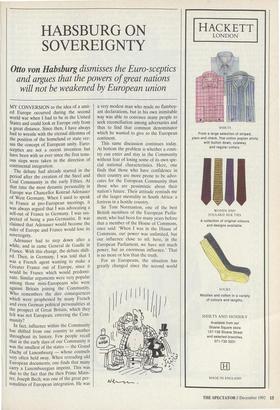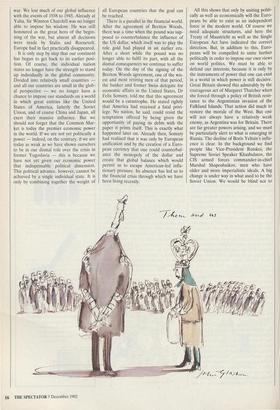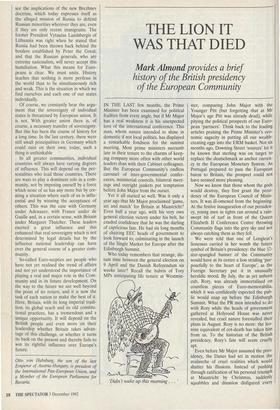HABSBURG ON SOVEREIGNTY
Otto von Habsburg dismisses the Euro -sceptics and argues that the powers of great nations will not be weakened by European union MY CONVERSION to the idea of a unit- ed Europe occurred during the second world war when I had to be in the United States and could look at Europe only from a great distance. Since then, I have always had to wrestle with the eternal dilemma of the position of the homeland or state ver- sus the concept of European unity. Euro- sceptics are not a recent invention but have been with us ever since the first tenu- ous steps were taken in the direction of continental integration.
The debate had already started in the period after the creation of the Steel and Coal Community in the early Fifties. At that time the most dynamic personality in Europe was Chancellor Konrad Adenauer of West Germany. When I used to speak in France at pro-European meetings, it was always argued that I was advocating a sell-out of France to Germany. I was sus- pected of being a pan-Germanist. It was claimed that Adenauer would become the ruler of Europe and France would lose its sovereignty. Adenauer had to step down after a while, and in came General de Gaulle in France. With this change, the debate shift- ed. Then, in Germany, I was told that I was a French agent wanting to make a Greater France out of Europe, since it would be France which would predomi- nate. Similar arguments were very popular among those mini-Europeans who were against Britain joining the Community. Who remembers the dire consequences Which were prophesied by many French and even German political personalities at the prospect of Great Britain, which they felt was not European, entering the Com- munity?
In fact, influence within the Community has shifted from one country to another throughout its history. Few people recall that in the early days of our Community it was the smallest of the states — the Grand Duchy of Luxembourg — whose counsels very often held sway. When rereading old European documents, one finds that many carry a Luxembourgian imprint. This was due to the fact that the then Prime Minis- ter, Joseph Bech, was one of the great per- sonalities of European integration. He was a very modest man who made no flamboy- ant declarations, but in his own inimitable way was able to convince many people to seek reconciliation among adversaries and thus to find that common denominator which he wanted to give to the European continent.
This same discussion continues today. At bottom the problem is whether a coun- try can enter and stay in the Community without fear of losing some of its own spe- cial national characteristics. Here, one finds that those who have confidence in their country are more prone to be advo- cates for the European Community than those who are pessimistic about their nation's future. Their attitude reminds me of the laager mentality in South Africa: a fortress in a hostile country.
Sir Tom Normanton, one of the best British members of the European Parlia- ment, who had been for many years before that a member of the House of Commons, once said: 'When I was in the House of Commons, our power was unlimited, but our influence close to nil; here, in the European Parliament, we have not much power, but an enormous influence.' That is no more or less than the truth.
For us Europeans, the situation has greatly changed since the second world war. We lost much of our global influence with the events of 1938 to 1945. Already at Yalta, Sir Winston Churchill was no longer able to impose his wisdom. He was still honoured as the great hero of the begin- ning of the war, but almost all decisions were made by Stalin and Roosevelt. Europe had in fact practically disappeared.
It is only step by step that our continent has begun to get back to its earlier posi- tion. Of course, the individual nation states no longer have the strength to stand up individually in the global community. Divided into relatively small countries — and all our countries are small in the glob- al perspective — we no longer have a chance to impose our standards on a world in which great entities like the United States of America, latterly the Soviet Union, and of course China and Japan, all exert their massive influence. But we should not forget that the Common Mar- ket is today the premier economic power in the world. If we are not yet politically a power — indeed, on the contrary, if we are today as weak as we have shown ourselves to be in our dismal role over the crisis in former Yugoslavia — this is because we have not yet given our economic power that indispensable political dimension. This political advance, however, cannot be achieved by a single individual state. It is only by combining together the weight of all European countries that the goal can be reached.
There is a parallel in the financial world. After the agreement of Bretton Woods, there was a time when the pound was sup- posed to counterbalance the influence of the US dollar, which itself was to play the role gold had played in an earlier era. After a short while the pound was no longer able to fulfil its part, with all the dismal consequences we continue to suffer today. On the day of the signing of the Bretton Woods agreement, one of the wis- est and most retiring men of that period, the banker and former Swiss delegate for economic affairs in the United States, Dr Felix Somary, told me that this agreement would be a catastrophe. He stated rightly that America had received a fatal privi- lege. No nation, he said, could resist the temptation offered by being given the opportunity of paying its debts with the paper it prints itself. This is exactly what happened later on. Already then, Somary had realised that it was only by European unification and by the creation of a Euro- pean currency that one could counterbal- ance the monopoly of the dollar and create that global balance which would permit us to escape American-led infla- tionary pressure. Its absence has led us to the financial crisis through which we have been living recently. All this shows that only by uniting politi- cally as well as economically will the Euro- peans be able to exist as an independent force in the modern world. Of course we need adequate structures, and here the Treaty of Maastricht as well as the Single European Act have indicated the correct direction. But, in addition to this, Euro- peans will be compelled to unite further politically in order to impose our own views on world politics. We must be able to defend our interests, because it is only by the instruments of power that one can exist in a world in which power is still decisive. Great Britain showed this admirably by the courageous act of Margaret Thatcher when she forced through a policy of British resis- tance to the Argentinian invasion of the Falkland Islands. That action did much to restore the morale of the West. But one will not always have a relatively weak enemy, as Argentina was for Britain. There are far greater powers arising, and we must be particularly alert to what is emerging in Russia. The decline of Boris Yeltsin's influ- ence is clear. In the background we find people like Vice-President Rutskoi, the Supreme Soviet Speaker 'Khasbulatov, the CIS armed forces commander-in-chief Marshal Shaposhnikov, men who have older and more imperialistic ideals. A big change is under way in what used to be the Soviet Union. We would be blind not to see the implications of the new Brezhnev doctrine, which today expresses itself as the alleged mission of Russia to defend Russian minorities wherever they are, even if they are only recent immigrants. The former President Vytautas Landsbergis of Lithuania was right when he stated that Russia had been thrown back behind the borders established by Peter the Great, and that the Russian generals, who are extreme nationalists, will never accept this humiliation. What this means for Euro- peans is clear. We must unite. History teaches that nothing is more perilous in the world than to be simultaneously rich and weak. This is the situation in which we find ourselves and each one of our states individually.
Of course, we constantly hear the argu- ment that the sovereignty of individual states is threatened by European union. It is not. With greater union there is, of course, a necessary transfer of sovereignty. But this has been the course of history for a long time. In the last century, there were still small principalities in Germany which could exist on their own; today, such a thing is unthinkable ' In all greater communities, individual countries will always have varying degrees of influence. This will depend on the per- sonalities who lead those countries. There are ways to play a dominant role in a com- munity, not by imposing oneself by a force which none of us has any more but by cre- ating a situation where each of us is influ- ential and by winning the acceptance of others. This was the case with Germany under Adenauer, with France under de Gaulle and, in a certain sense, with Britain under Margaret Thatcher. These leaders exerted a great influence and this enhanced that real sovereignty which is not determined by legal details but by the influence national leadership can have over the general course of a greater com- munity.
So-called Euro-sceptics are people who have not yet realised the trend of affairs and not yet understood the importance of playing a real and major role in the Com- munity and in its future development. On the way to the future we are well beyond the point of no return, and it is now the task of each nation to make the best of it. Here, Britain, with its long imperial tradi- tion, its global reach and its old constitu- tional practices, has a tremendous and a unique opportunity. It will depend on the British people and even more on their leadership whether Britain takes advan- tage of this challenge, or whether it turns its back on the present and thereby fails to win its rightful influence over Europe's future.
Otto von Habsburg, the son of the last Emperor of Austria-Hungary, is president of the International Pan-European Union, and a Member of the European Parliament for Bavaria.












































































 Previous page
Previous page